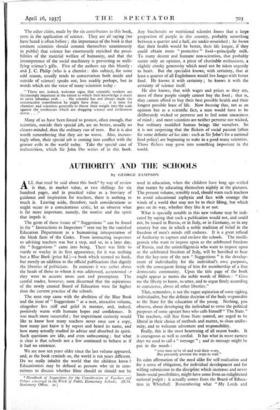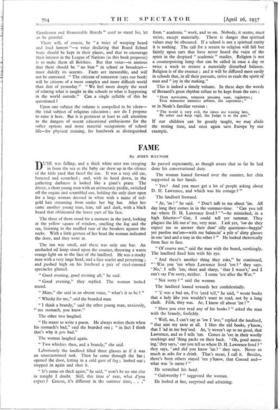AUTHORITY AND THE SCHOOLS
By GEORGE SAMPSON
ALL that need be said about this book* by way of review is that, in market value, at two shillings for six hundred pages, and in practical value as a breviary of guidance and inspiration for teachers, there is nothing to touch it. Leaving aside, therefore, such considerations as might occur to a conscientious critic, let us observe what is far more important, namely, the motive and the spirit that impels it.
The germ of these issues of " Suggestions " can be found in the " Instructions to Inspectors " sent out by the vanished Education Department as a humanising interpretation of the bleak facts of the Codes. From instructing inspectors to advising teachers was but a step, and so, in a later day, the " Suggestions " came into being. There was little to Startle or waylay in its first appearance, for it was nothing but a Blue Book (price 8d.)—a book which seemed no book, but merely an addition to the official publications that dignify the libraries of politicians. In contents it was rather above the heads of those to whom it was addressed, accustomed ro they were' to accents more curt and peremptory. The careful reader, however, soon discerned that the aspirations of the newly created Board of Education were far higher than the current practice of the schools.
The next step came with the abolition of the Blue Book and- the issue of " Suggestions " as a neat, attractive volume, altogether less stiff and gelid in manner, and, indeed, positively warm with humane hopes and confidences. It was much more successful ; but impertinent curiosity would like to know how many teachers never once saw a copy, how many just knew it by report and heard its name, and how many actually studied its advice and absorbed its spirit. Such questions are idle, and even unbecoming ; but what is clear is that schools not a few continued to behave as if it had no existence.
We are now ten years older since the last volume appeared, and, as the book reminds us, the world is ten years different. Do we really inhabit the world that the children know ? Educationists may be defined as persons who sit in com- mittees in' discuss whether films should or should not be
* Handbook of Suggestions for the Consideration of TeaChers and Others concerned in the Work of Public Elementary Schools. (H.M. Stationery Office. 29.)
used in education, when the children have long ago settled that matter by educating themselves nightly at the pictures. The present volume, sensibly read, should warn such teachers to avoid educational asphyxia and face with courage the winds of a world that may not be to their liking, but which goes on its way, whether they like it or not.
What is specially notable in this new volume may be indi- cated by saying that such a publication would not, and could not, be issued in Russia, or in Italy, or in Germany, or in any country but one in which a noble tradition of belief in the freedom of men's minds still endures. It is a great refusal of Authority to capture and enslave the schools. The intelli; gentsia who want to impose upon us the celebrated freedom of Russia, and the unintelligentsia who want to impose upon us the celebrated freedom of Italy, will be horrified to hear that the key-note of the new " Suggestions " is the develop- ment of individuality for the individual's own purposes, with the consequent fitting of him for membership of a free democratic community. Upon the title page of the book might appear as motto the noble words of Milton : " Give me the liberty to know, to utter, and to argue freely according to conscience, above all other liberties."
That, remember, is not the vague aspiration of some sighing individualist, but the definite doctrine of the body responsible to the State for the education of the young. Nothing, you observe, about developing the individual to serve the political purposes of some upstart boss who calls himself " The State." The teachers, still free from State control, are urged to be liberal in their choice of methods and matter, to shun unifor- mity, and to welcome adventure and responsibility.
Really, this is the most heartening of all recent books. It is courageous as well as cordial. It has what in more earnest days we used to call a " message" ; and its message might be put in the words :
" wise men ne'er sit and wail their woes, But presently prevent the ways to waiL"
Its calm affirmation of the need alike for self-realisation and for a sense of obligation, for individual development and for willing submission to the discipline which increases and never limits social possibilities, might have come from an enlightened national pulpit ; it actually comes from the Board of Educa- tion in Whitehall. Remembering what " My Lords and Gentlemen and Honourable Boards " used to stand for, let us be grateful.
There will, of course, be " a voice of weeping heard and loud lament "—a voice declaring that Board School brats should be kept in their places, and that to encourage their interest in the League of Nations (as this book proposes) is to make them all Bolshies. But that voice—so anxious that there should be " no bias " in school or broadcast— must dulcify its accents. Facts are inexorable, and will not be entreated. " The citizens of tomorrow (says our book) will be citizens of a more complex and more difficult world than that of yesterday." " We feel more deeply the need of relating what is taught in the schools to what is happening in the world outside." Can a single syllable of this be questioned ?
Upon one subject the volume is compelled to be silent— the vital subject of religious education ; nor do I propose to raise it here. But it is pertinent at least to call attention to the dangers of recent educational enthusiasms for the softer options and more material occupations of school life—for physical training, for handwork as distinguished from " academic " work, and so on. Nobody, it seems, must strive, except materially. There is danger that spiritual values may be obscured. If a school is not a spiritual entity it is nothing. The call for a return to religion will fall but faintly upon ears that have never heard the voice of the spirit in the despised " academic " studies. Religion is not a counterpoising lump that can be called in once a day or twice a week to restore a materially disturbed balance. Religion is of the essence ; and it will be diffused most easily in schools that, in all their pursuits, strive to exalt the spirit of man and " joy in the making " This is indeed a timely volume. In these days the words of Bernard's great rhythm refuse to be kept from the ears :
" Hora novissima, tempora pessima sunt, ,vigilemus ; Ecce minaciter imminet arbiter, ilk supremus ; "
or in Neale's familiar version :
" The world is very evil, the times are waxing late, Be sober and keep vigil, the Judge is at the gate."
If our children can be greatly taught, we may abide the testing time, and once again save Europe by our example.























































 Previous page
Previous page